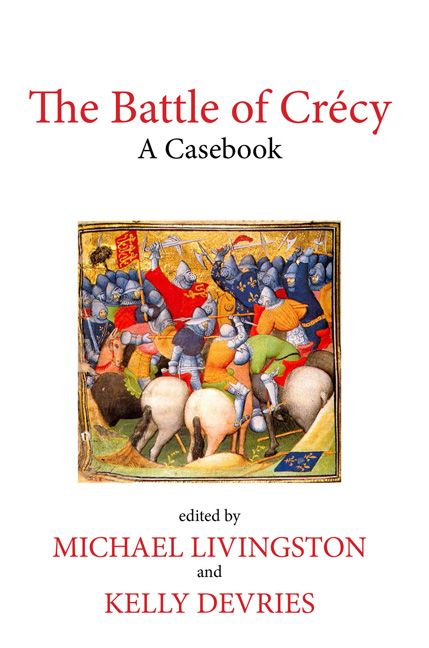Book contents
- Frontmatter
- Contents
- ILLUSTRATIONS
- CONTRIBUTORS
- PREFACE: THE SHAPE OF THE VOLUME
- MAP OF THE CRÉCY CAMPAIGN
- LOSSES UNCOUNTABLE: THE CONTEXT OF CRÉCY
- SOURCES ON THE BATTLE
- NOTES TO THE TEXTS
- ESSAYS ON THE BATTLE
- THE LOCATION OF THE BATTLE OF CRÉCY
- THE BOHEMIAN PARTICIPATION IN CRÉCY
- THE GENOESE CROSSBOWMEN AT CRÉCY
- THE TACTICS OF CRÉCY
- FROISSART'S HERCE AND CRÉCY
- THE ITALIAN PERSPECTIVE ON CRÉCY
- COUNTING THE DEAD AT CRÉCY
- THE AFTER-LIFE OF CRÉCY
- BIBLIOGRAPHY
- INDEX TO THE VOLUME
THE TACTICS OF CRÉCY
- Frontmatter
- Contents
- ILLUSTRATIONS
- CONTRIBUTORS
- PREFACE: THE SHAPE OF THE VOLUME
- MAP OF THE CRÉCY CAMPAIGN
- LOSSES UNCOUNTABLE: THE CONTEXT OF CRÉCY
- SOURCES ON THE BATTLE
- NOTES TO THE TEXTS
- ESSAYS ON THE BATTLE
- THE LOCATION OF THE BATTLE OF CRÉCY
- THE BOHEMIAN PARTICIPATION IN CRÉCY
- THE GENOESE CROSSBOWMEN AT CRÉCY
- THE TACTICS OF CRÉCY
- FROISSART'S HERCE AND CRÉCY
- THE ITALIAN PERSPECTIVE ON CRÉCY
- COUNTING THE DEAD AT CRÉCY
- THE AFTER-LIFE OF CRÉCY
- BIBLIOGRAPHY
- INDEX TO THE VOLUME
Summary
At his most confident, King Edward III could not have dreamed the result of the Battle of Crécy. At his most depressed, Philippe VI could not have nightmared the result of the Battle of Crécy. Edward, no doubt, had considered he might win; and Philippe, no doubt, had considered he might lose. After all, battle was the most risky military endeavor a premodern general might undertake.
This is why the smartest military leaders on the whole avoided battle. Mehmed II, the so-named “Conqueror,” tried never to fight a battle. The only time he did so was when a besieged population — for the siege was his preferred “conquering” strategy — rushed out from the walls and engaged his army on a battlefield, at Belgrade in 1456; in that encounter his Ottoman Turks were soundly defeated. For the next 56 years Belgrade was left alone by the Turks. William, also “the Conqueror,” and most famous for his great victory at the battle of Hastings in 1066, only fought two battles total during his long life (1028–1087); Harold Godwinson, William's opponent at Hastings also only fought two battles — he won the first, at Stamford Bridge, only to lose the second, a few weeks later at Hastings.
Both Philippe VI and Edward III had won battles before Crécy, so they knew what they were getting into, but Philippe's victory had been at Cassel, 18 years previously (1328), and Edward's at Halidon Hill, 13 years before (1333). Philippe's had been against relatively inexperienced and unskilled Flemish peasants and urban militias, with Edward's against more experienced and skilled Scottish soldiers. Both held numerical and technologicaltactical advantage over their enemies — French cavalry and English longbowmen — which aided in their victories; and it was these that the kings would rely on as their primary tactical forces at Crécy.
Who knows how confident their victories at Cassel and Halidon Hill made Philippe or Edward. The distance in time between them and Crécy seems significant. If memories fade, these certainly would have. Certainly, too, the legends that had followed these victories would have supplanted these fading memories.
- Type
- Chapter
- Information
- The Battle of CrécyA Casebook, pp. 447 - 468Publisher: Liverpool University PressPrint publication year: 2015



